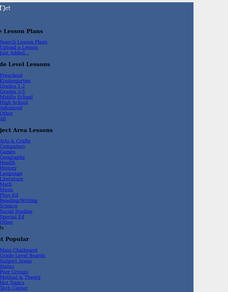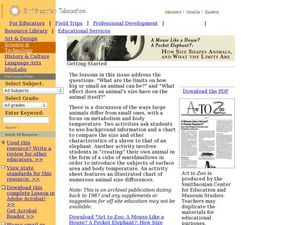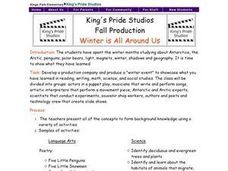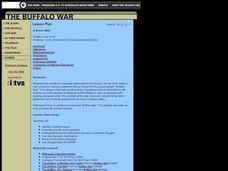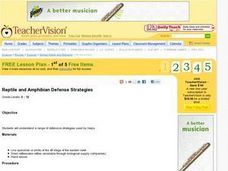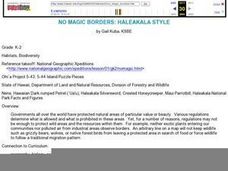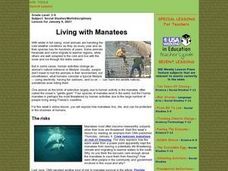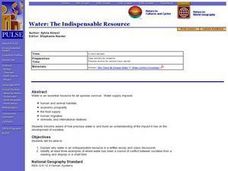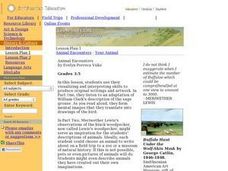Curated OER
Monitor Marine Migrants
Students, in groups, track the seasonal journey of a species, such as a shorebird, sea turtle, or marine mammal, using various sources of migration data
Curated OER
Chain Reaction
Learners study animal behavior and how it changes to its environment. In this animal lesson students design and conduct experiments.
Curated OER
Cooperative Learning, Sci., Tech., Lang
Students research, write, edit, revise and present a paragraph, using word processor, about animal of their choice, including description, where animal lives, what it eats, its habits, e.g. is it endangered, migration, hibernation,...
Curated OER
Human Evolution
Students investigate hominid evolution to learn the difference between a relative and an ancestor. They study the emergence of bipedalism and the related physical adaptations and cultural ramifications, and chart patterns of hominid...
Curated OER
What's All the Buzz About
Students participate in a game of charades to examine different animal behaviors. After reading an article, they discuss why bees waggle and how that behavior applies to humans. They research the behaviors of an animal of interest to...
Curated OER
How Size Shapes Animals
Students investigate how size affects large and small animals differently. In this animal lesson plan, students determine how size affects different animals by constructing their own animal out of marshmallows. Once students create...
Curated OER
Structural and Behavioral Adaptations
Students participate in a role playing lab that allows students to experience how different beak adaptations play a role in the type of food the animal can eat, therefore playing a role in the survival of the species.
Curated OER
Winter is All Around Us
Students present what they have learned on Antartica. Students identify deciduous and evergreen trees and plants; identify and study about the habitats of animals that migrate, hibernate, and adapt; study the Aurora and Aurora Borealis...
Curated OER
Cycles of Life in an Urban Habitat: Changes in Biodiversity
Second graders compare and contrast animate and inanimate objects. For this environmental science lesson, 2nd graders create simple food webs. They observe their environment and create a collage about it.
Curated OER
A Bison Web
High schoolers view a documentary on the treatment of the buffalo. In groups, they create a website using ideas and solutions they developed. They must include graphics or animation and a multi-level webpage. They share their pages...
Curated OER
Horseshoe Crab Fun
Marine biology masters will meet the horseshoe crab and red knot shore birds that feast upon the crab eggs. Begin with a discussion and then have learners write postcards from each animal detailing their migration trips. A few math...
Curated OER
Reptile and Amphibian Defense Strategies
Students study the stages of the Eastern newt either by collecting a live specimen or from pictures. They note the colors of the eft stage before reading the "Eastern Newt Species Account" that shows the newt's life stages, migration,...
Curated OER
No Magic Borders: Haleakala Style
Students discuss borders and boundaries. They discuss pollution and the fact that boundaries cannot stop pollution and that pollution affects even protected wildlife and plants. They participate in an activity in which they must place...
Curated OER
Climate in the Pacific Region
Students examine the main features of the climate of the Tropical Pacific region by looking at maps and charting the tracks of one or more recent cyclones. After a brief discussion, they answer questions bout convergence zones and the...
Nuffield Foundation
Observing Earthworm Locomotion
One acre of land can contain more than a million earthworms. Scholars collect earthworms to observe their movements. Once placed on paper, the sound of movement often fascinates pupils. When placed on glass, the earthworm is unable to...
Curated OER
Tick-Tock: Biological Clock
Students complete several activities that stimulate their assessment of time. They consider the term 'biological clock' and how animals in the wild depend on their own internal clocks for survival.
Curated OER
Living with Manatees
Students research the lives of manatees and how humans are contributing to their survival. They visit a variety of websites including a webcam.
Curated OER
Locating Echo
Students read the book The Adventure of Echo the Bat. For this animal science lesson, students read the book and create a chart labeled "Land Feature," "Habitat," and "Food." Students fill in the table according to where the character...
Curated OER
World Geography: Water: The Indispensable Resource
Young scholars are able to explain why water is an indispensable resource in a written essay and class discussion. They identify at least three examples of where water has been a source of conflict between societies from a reading and...
Curated OER
Animal Encounters
Students use their visualizing and interpreting skills to produce original writings and artwork.
Curated OER
Wild Animal Science
Students discover how environmental factors impact the survival of a population. For this landscape design lesson, students create a new animal and discuss the relationship between the animal and its environment before creating a habitat...
Curated OER
A Journey Through Time!
Young scholars discover more about conducting genealogical research on the challenges that their ancestors and others experienced during their immigration to Canada and their migration within Canada. They engage in a variety of creative...
Curated OER
Reading Research!
Young scholars observe the pictures in non-fiction books that focus on animals in the winter. In addition, they also listed to some read aloud books about hibernation, migration, adaptation and dormancy. Students draw pictures and write...
Curated OER
Mark-and-Recapture
Students investigate the mark-and-recapture method for estimating the population of an animal species. They evaluate given data to answer a set of questions.




